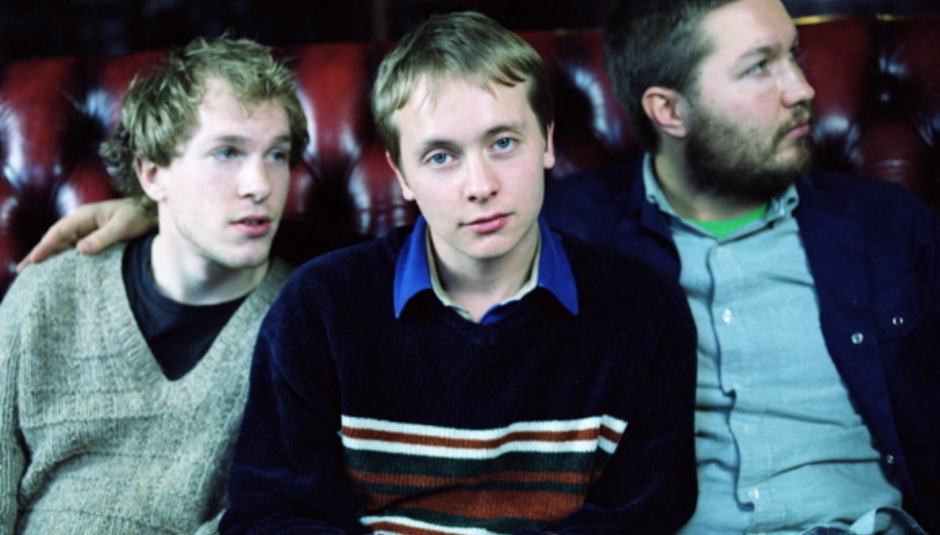When people say we’re indie, I think “oh they think that we’re shit”
In an alternate universe The Wave Pictures would’ve been forced to record latest release their Sweetheart EP in the picturesque surroundings of Villefranche-sur-Merthanks thanks to bass player Franic Rozycki owing £118,000 in back income tax. Frontman David Tattersall would’ve got hastily married in St. Tropez during their time away and drummer Johnny Helms’ wife would’ve been sentenced to six months’ imprisonment for assaulting a customs officer at Nice airport. A tour of North America would’ve followed the release of the EP, in turn producing a legendary film of the trip that would never see a widespread release thanks to the controversial footage of Johnny snorting cocaine off of a switchblade and David and Franic playing the bongos and a tambourine down the aisle of a plane as a groupie is mercilessly set upon by various crew members at 10,000 ft.
So how did the recent American tour go?
‘It’s a controversial subject’ says Tattersal.
Really? Shit. The alternate universe is bleeding into the reality. So what was it? Snorting cocaine up your bumhole off the flaming breasts of a Texan groupie and ‘performance artist’ called Tessy-Marie? Showering with JD and coke instead of soap and water? Did you eat a horse?
‘We just had some tough shows’.
Oh.
‘In Florida we played opening a country and western night and we were first on the bill. We were on at 8.30, off at 8.50, played a twenty minute set to five guys in cowboy hats waiting for a Hank Williams cover band to come on and headline. We tried to play some country two-steps, but it didn’t quite wash. We actually went down ok, given the circumstances’.
But what about the romance of the road and the mythic American highway? ‘When you’re touring in a band, you’re loading and unloading equipment and you’re not getting much sleep, you don’t feel like you’re in a Bruce Springsteen song at all, being in a band is nothing like that. He’s escaping from things when he goes out on the road, but when we go on the road, that’s when we go to work so it’s the opposite of escape, it’s turning up on time and doing everything by the clock’. Bummer. It would appear then, that the dividing line between alternate universe and reality remains intact.
Because the point I’m getting at, and the reason behind all this silly Rolling Stones-based waffle, is that the core elements are there to situate them in the Stones’ alternate universe, but we’ve been happy (myself included) to have kept them in the box labelled indie-pop, so most would mistakenly say The Queen is Dead instead of Exile on Main St or If You’re feeling Sinister instead of Marquee Moon. But like the Stones, the Wave Pictures are going to the roots of American music and twisting the best bits to suit their magpie needs and British vowels. As Tattersal says: ‘we’re very influenced by American music. Most of our influences are American and most of the time we’re thinking about American music, oddly enough. Most of what we listen to, Neil Young, Bob Dylan, country music, blues, rock and roll, it comes from America. We don’t have very many English influences. I’m not even sure what English music would be. It seems like it’s just a version of American music anyway’. And like Television, their show that night at Bush Hall makes clear their appreciation of, and ability to execute, a good guitar solo.
Video: The Wave Pictires: 'Sweetheart' (Take Away Show)
So seeing as people like me persist in somewhat misguidedly hanging the quintessentially English indie-pop tag around their necks, I wonder what the band actually think of the term. After a short period of puffed cheeks at being faced with what has become such a turgid phrase, Tattersall comes up with an answer. ‘Well the thing about it is, the term indie ought to mean something good. Like, literally independent in business, and then that ought to imply independent minded. It ought to mean independent record labels, ie not financed by major companies and independent minded original music, that’s what the term ought to mean. But of course what it actually means is blokes who are a bit hairy and smelly looking with guitars… and who are shit, and can’t rock or write songs. What it means to me now, if someone tells me it’s an indie band, I think that’s probably a shit band. But what it ought to mean is something good, I guess is what I think. So when people say we’re indie, I think ‘oh they think that we’re shit’, but they might mean it in a very positive way, they might mean that they think we’re very independent minded and not driven by making money but driven by wanting to make music, which is a good thing. That’s my answer to that [laughs]’.
Another possible mis-conception is the emphasis people lay on place and environment to the music that The Wave Pictures make, keen to play up the themes of small town angst and ennui. But as Tattersall states, ‘The funniest thing about people is that nobody feels that they’re a product of their environment, and everybody is, but nobody likes thinking about themselves in that way. I think of myself like everyone else does as an individual who has made their own choices and decisions about things, so I never think about myself as being like I am because I come from a small town in the Midlands. Jeff Lewis grew up in New York and you can’t be more of an outsider or more of a nerd or less like a typical dick-head rock star than Jeff Lewis’.
Tattersall once spoke about going to folk clubs as a kid and being enthralled by the performers in those small venues and the thrill in watching ‘a world unto itself’, where it didn’t matter if they fit into the rhythms of the music world outside of those four walls. This is kind of what has happened with The Wave Pictures. But are they happy with that situation, and would they ever want it to change? Tattersall says, ‘the folk club thing is weird because the three of us have never really talked about it. But when I was a kid, I never thought that those people were unsuccessful, I only thought someone was successful if they were good, and unsuccessful if they were bad. I thought, ‘what greater glory than playing to a bar full of people and singing really great songs’. And some of the best artists I’ve ever seen have been in that environment, and it definitely doesn’t work in the music world that the bigger the festival and the bigger the stage, the better the band gets. There’s just so much shit that’s successful, and I would like to be more successful, I would like more people to hear us, I would like for us to sell more records and be more popular and make more money, but at the same time I imagine we’d have to get shitter [everyone laughs] to achieve that’. Compromise eh? [Still laughing] ‘Yeah’.
Talk moves on to the changes affecting the ways in which we interact with music, with Tattersall pointing out that he doesn’t actually own a computer and that ‘my whole relationship to music as a consumer is through vinyl records and second hand cds, and that romantic experience, also a very boring experience a lot of the time, of going through lots of records in a record shop. And I like knowing the guy behind the counter and trying to talk to him. So for me personally, I’ve never gotten any pleasure out of the internet and listening to music through the internet. But it’s just a personal thing’. At this point I put forward my argument that Spotify and the like are presenting people with too much music, creating a ‘paradox of choice’ where greater freedom of choice in music available results in weaker connections with the music, so in turn perhaps we need to slow down a bit in regards to our levels of musical consumption. Does the band agree? ‘Definitely’ says Tattersall. ‘If someone makes me a compilation CD, or say I burn a CD off of Franic, I’d never get to know it as well as I would a vinyl record. So in terms of ownership, that’s more important than access to everything. Because we [the band] always talk about whether we have bought too many records and whether we have got to know them all and we’re only talking about a few records. But my dad told me when I was younger and had just started getting into buying records that ‘you can’t get to know more than one a week’. That was his way of trying to get me to not raise my pocket money by just buying one a week, but I think he’s right. If you get five albums off the internet and put them up on your computer, you’re never going to get to know them in the same way. It’s a funny thing’. Continuing on the theme of record consumption, Tattersall wonders ‘how many people actually listen to music without doing anything else. Like, how many people just put on an album and listen to it the way you would watch a film. I suspect few people don’t actually read or speak to their friends or do the washing up whilst the record is playing.’
I move things on to the way that the band writes their music, and specifically Tattersall’s impressionistic lyrics, asking about the balance between real-life experience and created story. Tattersall says, ‘it’s both of those things, but it’s also about fitting it to the music. 'Cinnamon Baby' is a good example of a son on the new EP where the lyrics without the music are dull and really meaningless and nothing much happens in them. And that was the idea to describe something completely mundane and put it to some really exciting music, dark music, and then it becomes something else, and I find that song quite affecting now. I write lots of bits down on different bits of paper. I’m always thinking about writing lyrics, I’m always think about taking lines from here or there or writing a certain kind of song and then when I get a guitar I’ll sit down and I’ll fit them into a song. And it terms of striking a balance with a story, for me like the song always comes first. So I’m always trying to write a song, start with nothing and write a song. Whereas, say Jeff Lewis or Darren Heyman are two good examples of songwriters who we’ve mentioned already who will start sometimes by thinking ‘here’s what I want to say, how can I say it in the form of a song’ and then they’re able to see that idea through and write it out as a song. With me, I never start thinking ‘I’ve got a certain thing I want to communicate’, I always start by just trying to drum up certain images and make certain connections in my mind or certain things that feel right. I genuinely do write a lot of songs that I don’t know what they mean and they come to mean something to me later. As long as it’s very vivid and makes some kind of impression, then I’m pleased and I’ll keep it. Does that make sense?’ It does.
Video: The Wave Pictures: 'If You Leave It Alone'
So what about the idea that the rhythm of the word and its place in a song can be just as, or more important than the word itself, and should lyrics ever be detached from the songs and seen separately? Tattersall says: ‘I like it when lyrics go against the music as well, and I like it when a line doesn’t rhyme because it leaps out, and I like it a lyrics that’s awkward as well, and I also like lyrics that are very musical, and that’s a big part of what I’m looking for, the feeling of the words and the sound of them. For me, I’m not interested in detaching lyrics from the music, the two go completely together. It’s not like Johnny Marr writing music and Morrissey writing words, I’m writing both and the two have to fit together. It’s songs that’s I love. I don’t love poetry, I don’t love literature, I love songs, so that’s all I’m trying to do, write good songs, I think. And too many songs don’t have interesting lyrics I guess, and all the songs I like do have good lyrics. Like, I’m not a good a songwriter as Hank Williams, that’s a good example of a master songwriter whose lyrics are beautiful, but he’s a song writer. Bob Dylan is a song writer. Reading Bob Dylan lyrics aren’t as good as I thought it would be, I expected it to be really good but they’re not. It’s not poetry it’s songs.’
At this point, with their stomachs grumbling the band ever so politely ask if we can wrap things up so they can pop over the road to get some dinner before the gig. Of course, I say, but also see if I can squeeze in one last question. There is a great video of Darren Hayman on Spanish television struggling through hazy interpretations when he is faced with this garbled peach. ‘When someone tells you that they love you, do you prefer to answer with romanticism or cynicism’? It was so backwardly beautiful, I decided to put it to Tattersall.
‘In real life?’, he replies.
I guess… or in the context of song.
‘Well I would rather listen to a song that was a song of heartbreak. That’s why I prefer listening to the blues for example, than listening to The Beach Boys talking about how great it is to go surfing. Fuck off and go surfing then.’
This final point reminds me of another, more recent band singing something about wanting to go surfing who should probably also just fuck off and go surfing. The Guitars or something, is that their name? I’m not sure, it escapes me now. Anyway, as I get up to leave, the alternate Rolling Stones universe that links The Wave Pictures through their English interpretations of American music, would at this point see them hovering up the finest cuts of fruit and meat from a lithe body laid out flat on a table. As it is, in the reality, the band and friends and family question the prices of the restaurant opposite. ‘£18 per head?’ ‘Yeah, I think it was the most expensive thing on the menu though’. But you guess they wouldn’t want it any other way, and neither would we. Long live those Wave Pictures.






















